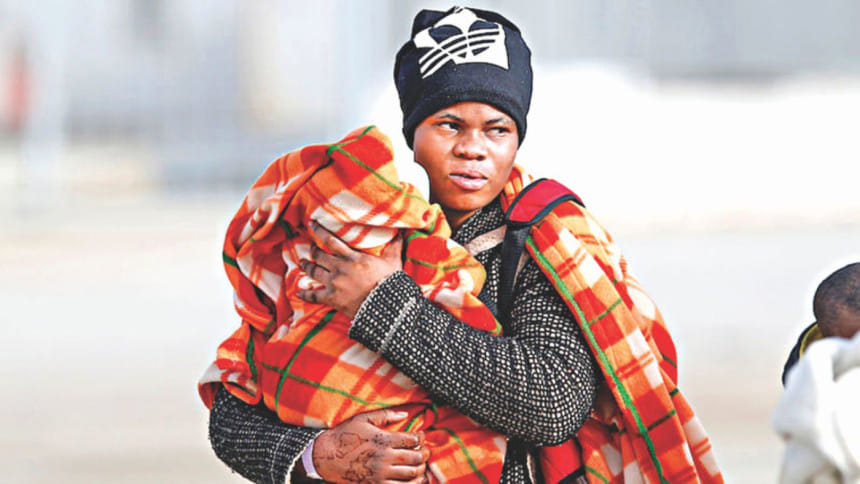The voices of women migrants

UN Member States gathered in Morocco on December 10-11 to adopt the Global Compact for Migration (GCM). The GCM is the first intergovernmental agreement to cover all dimensions of international migration. It promises to improve the lives of the world's 258 million migrants, their families and communities.
Almost half of the world's migrants are women and although both men and women migrate, it is not a gender-neutral phenomenon. Some countries place bans and restrictions on migration based on gender, marital or maternity status, or require the permission of a male relative. Women may also lack access to the information on migration and recruitment that they need to make empowered decisions and manage the risks.
Women are too often pushed into low-paid, undervalued work, whether on assembly lines in manufacturing or as domestic workers in private homes, often based on their gender. This not only restricts their employment opportunities, but also increases their exposure to gender-specific risks. Domestic workers, isolated in employers' homes, may face physical and sexual abuse, food and sleep deprivation, low wages and excessive working hours.
The text of the GCM addresses these and other gender-specific challenges. But its provisions only open the door for change.To make those changes a reality on the ground, we must ensure the implementation of the GCM is gender-responsive at every step of the way.
A review driven by those concerned
Gender-responsiveness is one of the explicit guiding principles of the GCM. This includes promoting gender equality and the empowerment of all women and girls—and moving away from addressing migrant women primarily through a lens of victimhood.
This also means recognising migrant women's independence, agency and leadership. This must not be limited to migration itself; as governments across the region prepare to implement the GCM, the voices of the women affected must also be front-and-centre of the upcoming processes to develop and review the next generation of labour migration policies.
Transforming migration so it works for all requires full participation across society, including women migrant workers, their employers and recruitment agencies. Only when migrant women are embedded in and empowered by these processes can we be sure migration policies are gender-responsive. Civil society organisations, trade unions and local officials can offer critical insights into issues like removing gendered barriers to accessing decent work at home and abroad, health care, skills training and justice.
When policy reviews don't include women, they too often get it wrong. For example, in some countries, restrictions and bans on women's migration are in place. These were introduced to protect women from exploitation, violence and abuse. But when we talked to women, we found this didn't stop migration at all—it just meant that more were using unlicensed brokers and irregular channels to migrate instead. This places women at even greater risk of high debts, trafficking, forced labour and exploitation. Worse still, it meant that when things went wrong, women couldn't seek justice.
Policies that include women work better for women. Consulting social partners, civil society organisations, women migrants and their representatives does more than just ensure women migrants' on-the-ground reality is reflected in policies. It also brings the community of stakeholders on board from the start. This makes for effective implementation and subsequent monitoring.
Early movers
There are initiatives already underway in our region to protect the rights of women migrant workers. These early movers hold valuable lessons for others as the GCM is endorsed.
In Bangladesh, the 2016 Expatriates' Welfare and Overseas Employment Policy includes a standalone directive on women's migration. The policy commits to establishing a unit dedicated to working with women migrants within the Ministry of Expatriates' Welfare and Overseas Employment, and increased representation of women in Labour Welfare Wings. Most importantly, it calls for targeted investment in women's full participation in the migration process.
UN Women has been working with our partners across society and government to put the gender-responsive principles of the GCM into practice from the earliest stages. In the Philippines, we brought together five government agencies, 23 civil society organisations and experts from international organisations and academia in early November to draw up national-level priorities to realise a gender-responsive GCM. The actions identified are a real opportunity to invest meaningfully in the participation of women migrant workers in decisions that affect their lives.
The GCM is an essential starting point for the next chapter in international cooperation on migration, and an historic opportunity. If it is seized, it will allow us to harness the potential of migration to bring lasting benefits to individuals and communities around the world.
Anna-Karin Jatfors is Regional Director, a.i. of UN Women Asia and the Pacific.










Comments